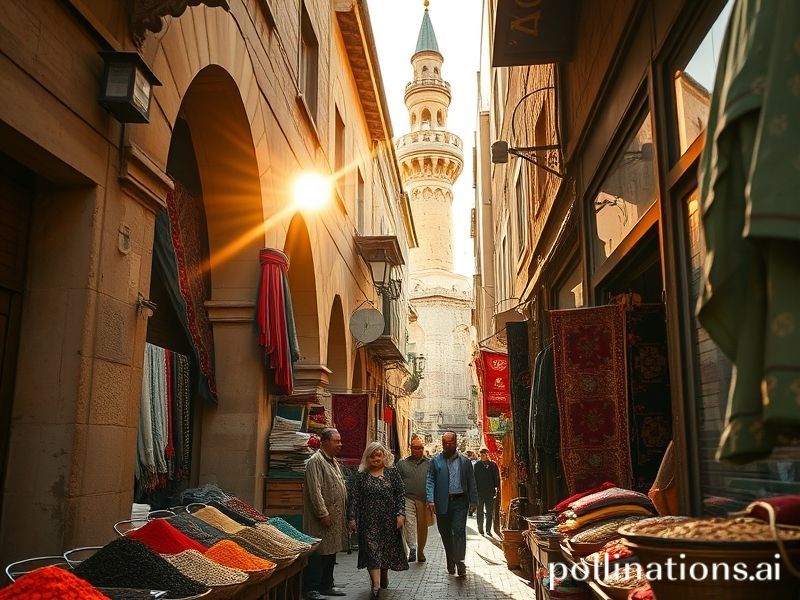Damascus: The Eternal City Still Outsourcing Its Apocalypse to the Rest of Us
Damascus: the city so old it makes Rome look like a startup. While the rest of us were still figuring out fire, Damascenes were already running a sophisticated bazaar, minting coins, and—if the local tour guides are to be believed—inventing both ice cream and passive-aggressive customer service. Today the Syrian capital is less a city than a palimpsest: layer upon layer of conquest, commerce, catastrophe, and the occasional really good kebab stand. Peel back the Ottoman stucco, you’ll find a Mamluk arch; scrape a little deeper, there’s a Roman column serving as structural support for somebody’s Wi-Fi router.
From a global vantage point, Damascus now functions as geopolitical shorthand for “messy.” Ask any foreign-policy intern to locate the epicenter of Cold War 2.0 energy and—if they’re not too busy doom-scrolling—they’ll point to the battered ring roads where Russian generals, Iranian drone salesmen, Turkish intelligence officers, and American special-ops types all share the same traffic jams. It’s the only place on earth where you can get stuck behind a World Food Programme convoy, a regime tank column, and an influencer shooting TikTok content, all honking at each other with the cosmopolitan impatience of people who have slightly different definitions of “emergency.”
The city’s current misery, of course, is profitable—just not for its residents. Sanctions lawyers in Brussels bill €600 an hour deciphering which flavor of humanitarian exemption covers lentils versus luxury cars. Defense contractors in Nevada A/B-test drone software over the suburbs, collecting gigabytes of high-resolution despair. Meanwhile, Lebanese middlemen in nearby Beirut run a side-hustle arbitraging diesel, captagon pills, and Instagrammable outrage. The entire planet has learned to monetize Damascus without ever having to learn how to pronounce “Mezzeh” correctly.
Western capitals periodically pretend to care. Every few years some earnest diplomat releases a “road map” that looks suspiciously like the last road map, only with a new font. The document promises “accountability” and “transitional justice,” two phrases that play well on the think-tank circuit and absolutely nowhere else. The Syrian regime, ever the gracious host, files the paperwork next to earlier peace plans (Geneva, Vienna, Astana, Sochi—collect the whole set!) and resumes bombing the city’s outskirts before the toner dries. Everyone involved then retires to five-star hotels to compare notes on which sanctions loophole allows for truffle risotto.
And yet—because humans are perverse—the city refuses to die. Satellite images show rooftop gardens sprouting in districts whose street grids have otherwise vanished into rubble. A French NGO just crowdfunded a microbrewery that serves a citrus IPA named, with pitch-black irony, “Road to Nowhere.” The local symphony orchestra, half its members now refugees in Germany, still livestreams from a bunker. They open each performance with the national anthem, followed immediately by a Mozart piece that sounds suspiciously like a coping mechanism. Viewers from Toronto to Tokyo donate in crypto, proving that even in hell you can monetize hope—transaction fees apply.
Global implications? Simple. Damascus is the stress-test for every international norm we pretend to cherish. Chemical weapons bans, rules of siege warfare, the very concept of “responsibility to protect”—all have been microwaved here until the labels peeled off. If the world can’t fix Syria, it can’t fix anywhere. That’s why nervous security councils from Brasília to Bangkok keep a weather eye on the capital: if Damascus finally implodes, the resulting shockwave of refugees, militias, and unregulated TikToks will make previous crises look like a polite wine tasting.
In the end, Damascus endures the way an unpaid parking ticket endures: crumpled, rain-soaked, but still technically legible. Outsiders will keep projecting their fantasies onto its cracked walls—Silk Road rebirth, Belt-and-Road bonanza, or the next hipster weekend break once the shooting stops and the boutique hotels open. The city, meanwhile, will keep doing what it has done for four millennia: sell you something, overcharge you for it, and then politely forget your name the moment you leave. Because in Damascus, history doesn’t repeat itself—it just switches currency and carries on.







